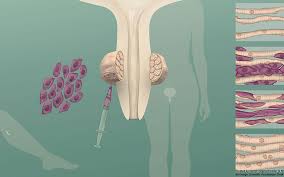New Phase 2b results for amlitelimab support potential for best-in-class maintenance of response in atopic dermatitis
- Late-breaking data at AAD show sustained off-drug improvements of AD signs and symptoms with amlitelimab for 28 weeks
- The safety profile for patients dosed to 52 weeks was consistent with amlitelimab 24 weeks data showing it to be well-tolerated with no new safety concerns identified
- Durability of response supports quarterly dosing currently being investigated in Phase 3 pivotal program
- Sustained biomarker reduction suggests the modulation of immune response and durable disease control via the blockade of OX40L, a non-T cell depleting mechanism
- Amlitelimab is one of 12 potential blockbusters in Sanofi’s leading immunology pipeline, results for a Phase 2 asthma study expected in H2 2024 and three additional Phase 2 study starts expected by year-end
Positive results from Part 2 of the investigational amlitelimab Phase 2b study STREAM-AD showed sustained improvement of signs and symptoms for 28 weeks in adults with moderate to severe AD who previously responded to amlitelimab and continued treatment. High responder rates were also observed in participants who were taken off amlitelimab. The safety profile was consistent with Part 1 of the study with amlitelimab being well-tolerated and no new safety concerns identified. These results were presented as part of a late-breaking session at the American Academy of Dermatology (AAD) 2024 Conference in San Diego and support the quarterly (every 12-week) dosing of amlitelimab 250 mg with 500 mg loading dose (LD) now being investigated in a larger Phase 3 clinical program (OCEANA).
Professor Stephan Weidinger, M.D, Ph.D
Director, Professor, Chair of Department of Dermatology and Allergy, University Hospital Schleswig-Holstein
“Despite available treatment options, not all patients with moderate-to-severe atopic dermatitis respond sufficiently to these treatments, and many continue to suffer from skin lesions and symptoms such as persistent itch, which can have a high impact on their day-to-day lives. Results from this part of the study indicate amlitelimab’s potential for durable off-drug efficacy which supports the evaluation of a less frequent every 12-week dosing. This could offer an important benefit in the treatment of AD patients.”
In the second part of the dose-ranging STREAM-AD study, responders to amlitelimab who achieved a 75% improvement in Eczema Area and Severity Index (EASI-75) score and/or Investigator Global Assessment (IGA) score of 0 or 1 during the 24-week treatment period (Part 1) were re-randomized to explore the maintenance of clinical response over an additional 28-week period with continued amlitelimab treatment or amlitelimab withdrawal. Across all dose arms, patients who continued amlitelimab treatment maintained high EASI-75 and/or IGA 0/1, IGA 0/1, and EASI-75 responder rates through 28 weeks. High responder rates were also demonstrated among patients who were taken off treatment.
In 69.2% of patients with continued treatment with amlitelimab 250 mg Q4W with 500 mg loading dose (LD) vs 58.8% of patients withdrawn from treatment IGA 0/1 and/or EASI-75 response was maintained.
An analysis including pooled dose-arms showed that IGA 0/1 response was maintained in 71.9% of patients with continued treatment vs 57% of patients withdrawn from treatment. In this analysis, EASI-75 response was maintained in 69% of patients with continued treatment vs. 61.6% of patients withdrawn from treatment.
AD-related biomarkers remained reduced at Week 52 in both amlitelimab withdrawn and continuing groups, despite amlitelimab reaching negligible levels in serum. Reduction of TARC, eosinophils, and IL-22 observed at Week 24 was maintained during withdrawal as well as in patients continuing treatment to Week 52. These biomarker data suggest the modulation of inflammatory T cells via the blockade of OX40L and durable control of AD after amlitelimab withdrawal.
Naimish Patel, M.D.
Head of Global Development, Immunology and Inflammation, Sanofi
“It’s unprecedented to see this type of durability of clinical response, which we believe could be very meaningful to patients and is the reason why we selected an every 12-week dosing regimen in the AD pivotal program. AD is a chronic, lifelong disease, which means we must strive to provide a portfolio of solutions to patients that matches their individual needs and puts as little burden on them as possible. We are also moving with speed in our exploration of amlitelimab's potential in 5 other chronic inflammatory diseases, including asthma, hidradenitis suppurativa, scleroderma, celiac disease, and alopecia. In addition, we are exploring 6 other innovative MOAs in 8 dermatologic indications underscoring our commitment to patients with high unmet medical needs.”
The aggregated safety profile of amlitelimab in Part 2 of this study was consistent with that of Part 1, with amlitelimab being well-tolerated, and no new safety concerns were identified during the 28-week maintenance/withdrawal period. Overall rates of treatment-emergent adverse events (TEAEs) were 69.8% for continued amlitelimab treatment, 71.9% for the amlitelimab withdrawal-arm and 66.7% for placebo. TEAEs more commonly observed included headache (11.6% amlitelimab continuation, 3.9% amlitelimab withdrawal, 6.7% placebo), upper respiratory tract infection (9.3% amlitelimab continuation, 5.5% amlitelimab withdrawal, 20% placebo). No adverse events such as fever or chills, oral ulcers or conjunctivitis were observed across doses.
Amlitelimab is a fully human non-T cell depleting monoclonal antibody that blocks OX40-Ligand, a key immune regulator, and has the potential to be a first- or best-in-class treatment for a range of immune-mediated diseases and inflammatory disorders, including moderate-to-severe atopic dermatitis (Phase 3), asthma (Phase 2), hidradenitis suppurativa (Phase 2), scleroderma, celiac disease, and alopecia (Phase 2 studies to be initiated in 2024). By targeting OX40-Ligand, amlitelimab aims to restore balance between pro-inflammatory and regulatory T cells.
Amlitelimab is currently under clinical investigation, and its safety and efficacy have not been evaluated by any regulatory authority.






















